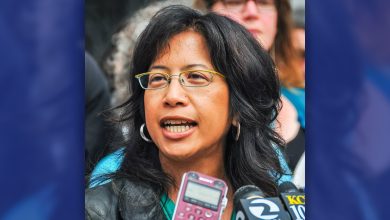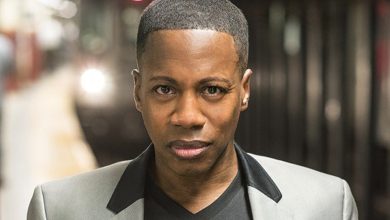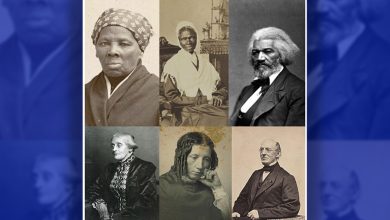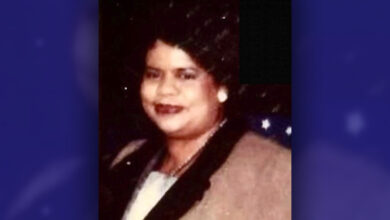Where’s Our Sense of Urgency?
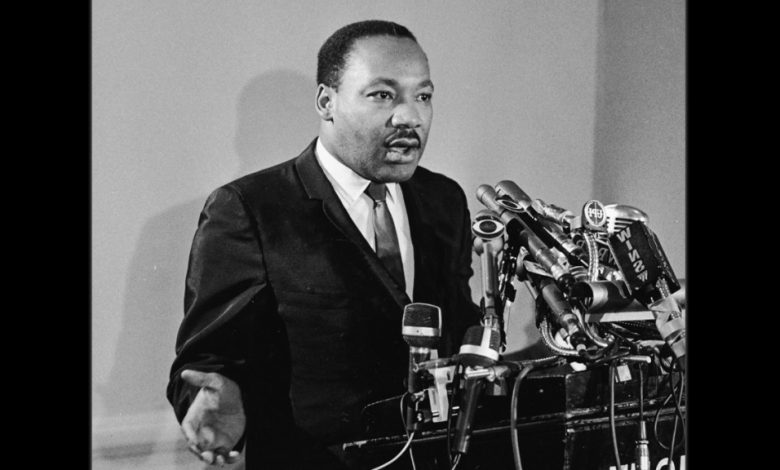
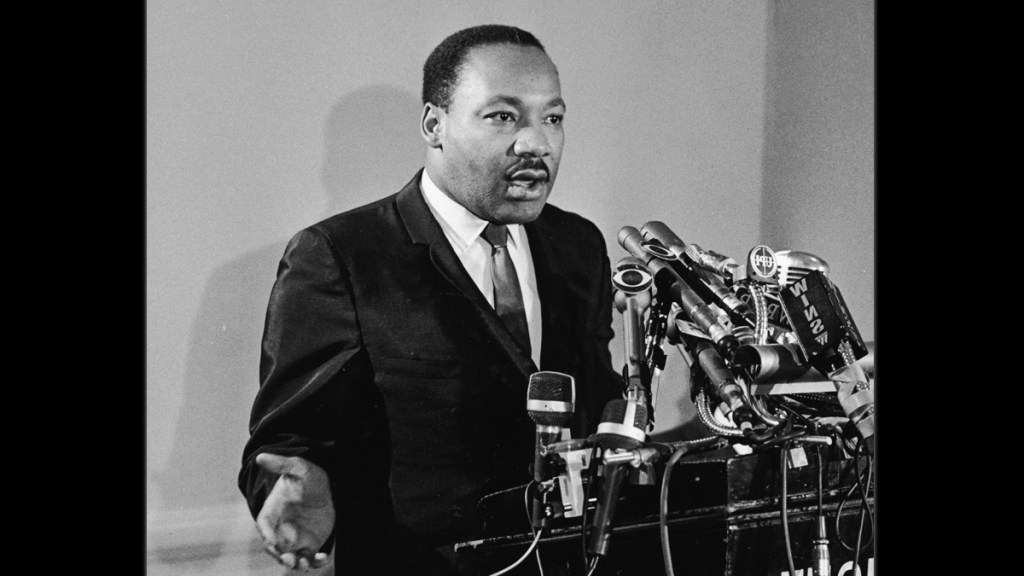
ABOVE: American Civil Rights leader Martin Luther King, Jr. (1929-1968) speaks at a press conference for Clergy & Laymen Concerned About Vietnam, held at the Belmont Plaza Hotel, New York City, January 12, 1968. He announced the Poor People’s March On Washington at this event. (Photo by John Goodwin/Getty Images)
We must channel Dr. King as we address the issues negatively impacting African Americans in 2023 and beyond
The United States government has acknowledged and celebrated the life and legacy of Dr. Martin Luther King Jr. on the third Monday in January every year since 1986, as that is the day that has been officially set aside as a federal holiday to honor him.
Prior to his assassination, Dr. King served as the most prominent voice for African Americans during the Civil Rights movement. He marched, protested, was arrested, delivered speeches, sat down with elected officials, and spoke out on many significant issues that impacted the Black community during that time.
His advocacy brought about many changes for Blacks in this country, and his efforts led to the eventual passage of the Civil Rights Act of 1964, the Voting Rights Act of 1965, the desegregation of city services in Montgomery, Alabama, and much more.
So, as the entire nation celebrates the life and legacy of Dr. King once again, I have a few questions for us all to ponder.
When it comes to remembering Dr. King, what typically comes to mind about him, particularly for African Americans?
Is it the active role Dr. King played in the Civil Rights movement that led to many progressive legislative changes that sought to improve the social conditions of Black people in America?
What about Dr. King’s famous “Normalcy, Never Again” speech—often referred to as the “I Have a Dream” speech—that was delivered at the March on Washington for Jobs and Freedom event at the nation’s capital in Washington D.C. in 1963?
to an overflow crowd at the Mason Temple Church of God in Christ Headquarters in Memphis, Tennessee, during the 1968 sanitation workers’ strike?
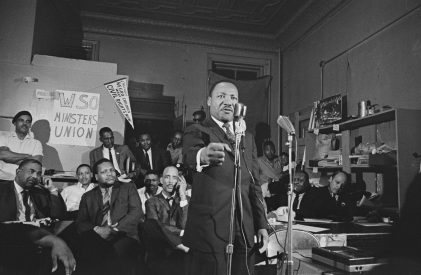
American civil rights activist Martin Luther King Jr. (1929 – 1968) addresses a meeting in Chicago, Illinois, 27th May 1966. (Photo by Jeff Kamen/Michael Ochs Archives/Getty Images)
Or is it the assassination of Dr. King that took place the day after his “I’ve Been to the Mountaintop” speech at the Lorraine Motel in Memphis, Tennessee, on April 4, 1968?
Regardless of which one you may have picked, all of those are significant chapters in the life and legacy of Dr. King, but there is so much more we should be discussing and remembering about this historical icon that should keep us sober-minded and focused for 2023 and beyond.
Do we just get excited about the Dr. King holiday when it comes every third Monday in January, because it gives us an opportunity to share our favorite Dr. King speech, Dr. King quote, or Dr. King meme as a way of showing how in tune we are with his life and legacy?
We should never discuss the full life and legacy of Dr. King without talking about his passion, advocacy, and commitment to make sure every current and future African American has an opportunity to have equitable and unhindered access to economic opportunities, a quality education, affordable housing, voting rights, fairness in the justice system, and all other inalienable rights afforded to every American in the U.S. Constitution.
As we have now crossed over into 2023, there are still many areas that need to be addressed that are negatively impacting African Americans in the U.S., such as:
Long-standing structural racism and systematically oppressive policies that have infiated countless industries, systems, and entities
Extremely higher health disparities in areas such as cancer, COVID-19, maternal mortality, and much more
Being incarcerated in state prisons across the U.S. at nearly five times the rate of whites
Educational disparities relative to equitable funding and quality
A widening wealth gap between Blacks and whites
Unemployment issues continuing to persist
Homicides and aggravated assaults in the community continuing to rise
Police brutality and unarmed killings by law enforcement still happening
Lack of mental health resources and support
An all-out assault on voting rights and making voting more difficult
African Americans experiencing homelessness at a higher rate than Whites
There are so many other issues we could mention, but you get the point.
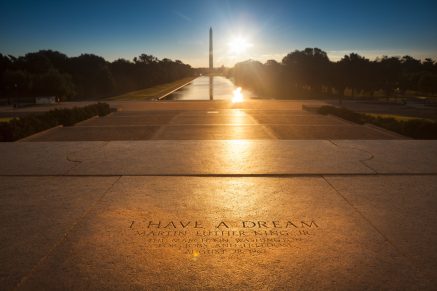
Washington D.C., USA – September 23, 2012: Martin Luther King quote inscription on the steps of the Lincoln Memorial on The National Mall. “I Have a Dream” was a public speech delivered by American civil rights activist Martin Luther King Jr. on August 28, 1963, in which he calls for an end to racism in the United States. Delivered to over 250,000 civil rights supporters from the steps of the Lincoln Memorial during the March on Washington, the speech was a defining moment of the American Civil Rights Movement.
What we need to truly ask ourselves during this time of remembrance and reflection of Dr. King in 2023, is have we done anything substantive with the amazing blueprint he left for us to follow after he was tragically assassinated? What have we done that serves as a true reflection of who Dr. King was and what Dr. King stood for?
Dr. King told the nation that, “It would be fatal for the nation to overlook the urgency of the moment,” but what does that really mean to us as African Americans today?
As aforementioned, we have some extremely serious issues that we are facing here in 2023—that did not begin in 2023—which require us to deal with them with a sense of urgency.
These urgent issues are really not new but are practically a more modernized version of the urgent issues Dr. King fought against and ultimately was murdered for.
We must not be naïve in thinking that these issues will get resolved by themselves without our proactive efforts and sacrifices, or by waiting on someone else to solve them for us.
Dr. King also said, “We will have to repent in this generation, not merely for the hateful words and actions of the bad people, but for the appalling silence of the good people. Human progress never rolls in on wheels of inevitability; it comes through the tireless efforts of men willing to be co-workers with God, and without this hard work, time itself becomes an ally of the forces of social stagnation.”
We can’t walk around and act like everything is normal when it’s not. We must do something, and do something now, with a strong sense of urgency as Dr. King stated.
If Dr. King was alive today, there is no question about what he would be doing today—advocating—but Dr. King is no longer with us.
We are here, however, and we must act with a strong sense of urgency.
If we truly appreciate Dr. King, the way we profess to, we must embrace everything Dr. King embodied and stood for—not just the things about him that are currently trendy or have become culturally acceptable now that he is no longer physically with us.
Dr. King was more than just a prolific orator or great speechwriter who spoke to crowds and sought ovations and rounds of applause for himself.
Dr. King was a bold and expressive advocate for Black people.
Dr. King was an uncompromising and visionary leader who constantly fought to ensure African Americans would have the same rights, equity, resources, and freedom that whites have.
Although he is no longer physically with us, Dr. King’s “dream” still lives on, and we must never allow it to die or be forgotten.
Dr. King still wants us to have economic vibrancy, wealth generation, voting rights, social justice, affordable housing, freedom from police brutality, and an eradication of hatred, bigotry, and racial injustice in this country.
Dr. King is not some weak, neutered, or watered-down version of what many in dominant culture seek to lessen his relevance to be. Dr. King was a powerful and faith-filled man who had his every move monitored by a federal government that sought to vilify him every chance they got.
Dr. King was a strong man who got arrested several times, who was beaten, who received constant death threats, who was wiretapped, and who was even assassinated because of his strong beliefs and unwavering convictions.
So, as we take this time to look back at the life and stellar legacy of Dr. King, we don’t have to wonder what this great Black man would think of today’s America, because he left us something tangible that we can all use to remind us of what he thinks. He left all of us his speeches, his writings, and some real-life activities that spoke louder than any of the words he ever uttered.
Dr. King is no longer here with us physically, but his words still resonate loudly with us all.
Dr. King once said, “Our lives begin to end the day we become silent about things that matter.”
Black Lives Matter, and that is not just some cliché phrase or cultural nuance. That is real and Dr. King’s words and his body of work, while here on Earth, are clear indicators that he would not want any of us to be “silent about these things that matter” when it comes to Black people in America today.
Dr. King would want all of us to do what he would be doing if he was still living among us today—he would be sounding the alarm about the plight of African Americans and advocating to address every single issue that continues to impact us.
So again, as we reflect and remember Dr. King, let us also take heed to his impactful and meaningful words and deeds while commemorating his life and legacy, especially considering the sacrifices he made to get African Americans to the point where we find ourselves today.
The post Where’s Our Sense of Urgency? appeared first on Houston Forward Times.
